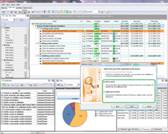|
Today, different types of collaboration software are widely used to support different activities taking place in workgroups in terms of facilitating interactions between team members for their better productivity, awareness and discipline. In order to optimize corporate IT costs, many companies aspire to find the best online software matching their specifics and style of working. In this context, one of the critical factors is the type of IT infrastructure used for deploying computational resources of collaborating team. The mentioned type of IT infrastructure means if it is open or close. In such a way we can outline two main types – desktop systems (installable) and online solutions (working via a web browser and Internet). Let’s consider them little bit closer in the following paragraph. Online or Desktop collaboration tools – define your case and make decision: Long-term business teams: Stable business workgroups where the most of people work within one location (one office) are predominantly serviced by close IT infrastructure – internal office LAN, server and software applications. The features of such system are its higher capacity and security, because of its limited, regulated and controlled communication with external world – with Internet or other close systems. Close systems can work without Internet, and it is preferable, in such conditions, to use desktop packages deployable over corporate LAN and individual computers. Using desktop collaboration software in long-term workgroups is a preferable choice because of its greater security, speed of informational turnover (reading-writing data), and avoiding any issues related to Internet. Understanding this, software developers keep producing new and new free and commercial products, so you have quite wide choice to match your needs. Temporal virtual teams: Teams of free-lancers working in different locations (cities, countries, continents) use open IT infrastructure (Internet) to deploy their virtual connections. For this purpose online collaboration software can be used. Actually this type of software is called “online” (as well as can be called “PHP”) because it works through special web-sites providing such services. There are different forms of teamwork offered on the Web – some tools work like MS Word for sharing textual information, or like online collaboration Excel for sharing spreadsheets. Traditionally, using that software is connected to certain risks and inconveniences, like slow performance and server time-outs, because virtual communications are deployed over public infrastructure and serviced by remote server(s). Using online freeware is not advisable for serious projects, because of high risk of losing data due to crash of remote server (in this case usually no compensations are guaranteed to users). |
||
Often, aspiring to minimize costs of maintaining their IT infrastructures, company managers try to use online collaboration freeware, but this approach is fraught of potential problems, because online systems are usually poorly supported and featured. If you are really interested in safety of your data, free application is not for you. It is better to consider one of commercial products, like one described in the next paragraph: |
||
|
VIP Task Manager is not online or desktop collaboration free software, but reliable and effective commercial tool with regular updates and qualified support. This client-server software will surely help you to p lan, schedule, allocate and control tasks on the projects, as well as to organize teamwork between different departments, divisions or even companies . This tool features collaboration software online capabilities (possibility to communicate through Internet). Unlike many open source tools, it doesn’t require additional configuration or development, but it can be used right after easy installation. |
||
 |
|
 |
VIP Task Manager |




 Play Demo
Play Demo